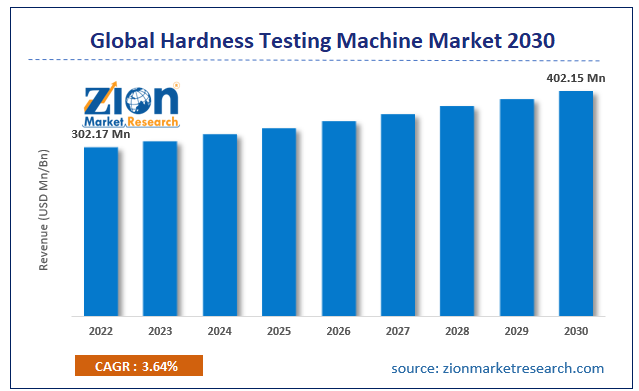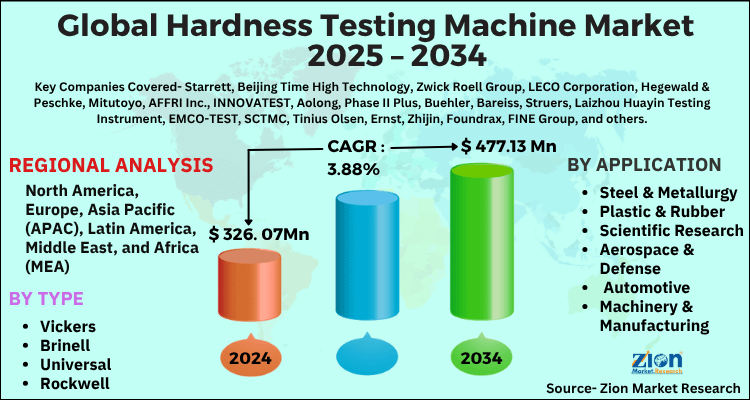Global Hardness Testing Machine Market Size, Share, Growth Analysis Report - Forecast 2034

Hardness Testing Machine Market By Type (Vickers, Brinell, Universal, Rockwell, Others), By Application (Steel & Metallurgy, Plastic & Rubber, Scientific Research, Aerospace & Defense, Automotive, Machinery & Manufacturing, Electronics, Healthcare), and By Region: Global and Regional Industry Overview, Market Intelligence, Comprehensive Analysis, Historical Data, and Forecasts 2025 - 2034
| Market Size in 2024 | Market Forecast in 2034 | CAGR (in %) | Base Year |
|---|---|---|---|
| USD 326.07 Million | USD 477.13 Million | 3.88% | 2024 |
Hardness Testing Machine Market: Industry Perspective
The global hardness testing machine market size was worth around USD 326.07 Million in 2024 and is predicted to grow to around USD 477.13 Million by 2034 with a compound annual growth rate (CAGR) of roughly 3.88% between 2025 and 2034. The report analyzes the global hardness testing machine market's drivers, restraints/challenges, and the effect they have on the demands during the projection period. In addition, the report explores emerging opportunities in the hardness testing machine industry.
The market report is an indispensable guide on growth factors, challenges, restraints, and opportunities in the global market space. The hardness testing machine market report covers the geographical market along with a comprehensive competitive landscape analysis. It also includes cash flow analysis, profit ratio analysis, market basket analysis, market attractiveness analysis, PESTEL analysis, SWOT analysis, Porter’s five force analysis, and value chain analysis. Additionally, the hardness testing machine industry report explores the investor and stakeholder space to help companies make data-driven decisions.
Hardness Testing Machine Market: Overview
A hardness testing machine is an instrument used for measuring the hardness of a substance. These instruments help manufacturers in ensuring that their goods meet specifications and core standards along with guaranteeing their durability. The state-of-art hardness testing machines are utilized in a large range of applications. They are based on systems that make use of new mechatronic parts for high-precision testing in laboratories, quality assurance, and production-line testing. New product launches have contributed to a burgeoning demand for hardness testing machines in a slew of end-use sectors. For instance, in May 2023, ZwickRoell Indentec, a key supplier of material testing instruments, declared the launching of a new brand of touchscreen Rockwell hardness testing machines.
Key Insights
- As per the analysis shared by our research analyst, the global hardness testing machine market is estimated to grow annually at a CAGR of around 3.88% over the forecast period (2025-2034).
- Regarding revenue, the global hardness testing machine market size was valued at around USD 326.07 Million in 2024 and is projected to reach USD 477.13 Million by 2034.
- The hardness testing machine market is projected to grow at a significant rate due to rising demand from automotive and aerospace industries, stringent quality control standards, technological advancements in portable and automated testing devices, and increasing focus on material durability and reliability.
- Based on Type, the Vickers segment is expected to lead the global market.
- On the basis of Application, the Steel & Metallurgy segment is growing at a high rate and will continue to dominate the global market.
- Based on region, North America is predicted to dominate the global market during the forecast period.
Hardness Testing Machine Market: Dynamics
Key Growth Drivers:
The hardness testing machine market is propelled by rapid industrialization and expanding manufacturing activities across sectors such as automotive, aerospace, metalworking, and electronics, where quality control and material performance are critical. Technological advancements—like automated digital testers, micro-hardness systems, and integration with Industry 4.0 platforms—improve accuracy and throughput, encouraging adoption. Growing emphasis on product reliability and regulatory compliance, alongside rising demand for lightweight, high-strength materials that require precise testing, further fuels market growth.
Restraints:
High initial capital expenditure for advanced hardness testing equipment and the ongoing costs of calibration and maintenance limit adoption, particularly among small and medium-sized manufacturers. The need for skilled technicians to operate sophisticated systems and interpret results poses another barrier, especially in regions with limited technical training infrastructure. Market fragmentation and the presence of low-cost, lower-accuracy alternatives can also depress prices and margins for premium suppliers.
Opportunities:
Expansion of manufacturing capabilities in emerging economies offers considerable market opportunities as these regions upgrade quality-assurance processes. Opportunities also lie in developing portable and handheld hardness testers for field inspections, and in software-enabled solutions that offer cloud connectivity, automated reporting, and predictive maintenance. Collaboration with material science research and emerging sectors—like additive manufacturing and advanced composites—creates new use cases for tailored hardness testing solutions.
Challenges:
Ensuring consistent accuracy across diverse testing standards and material types remains a key technical challenge, as does meeting stringent international certification requirements that vary by industry. Rapid material innovation (e.g., novel alloys, coated surfaces, and composites) demands continual R&D investment to adapt testing methods. Competitive pricing pressures from commoditized products, supply-chain disruptions for precision components, and cybersecurity risks associated with connected testing systems add operational and strategic challenges for market players.
Hardness Testing Machine Market: Segmentation Analysis
The global hardness testing machine market is segmented based on Type, Application, and region. All the segments have been analyzed based on present and future trends and the market is estimated from 2025 to 2034.
Based on Type, the global hardness testing machine market is divided into Vickers, Brinell, Universal, Rockwell, Others.
On the basis of Application, the global hardness testing machine market is bifurcated into Steel & Metallurgy, Plastic & Rubber, Scientific Research, Aerospace & Defense, Automotive, Machinery & Manufacturing, Electronics, Healthcare.
The Regional, this segment includes the current and forecast demand for North America, Europe, Asia Pacific, Latin America,and the Middle East and Africa.
Hardness Testing Machine Market: Report Scope
| Report Attributes | Report Details |
|---|---|
| Report Name | Hardness Testing Machine Market |
| Market Size in 2024 | USD 326.07 Million |
| Market Forecast in 2034 | USD 477.13 Million |
| Growth Rate | CAGR of 3.88% |
| Number of Pages | 211 |
| Key Companies Covered | Starrett, Beijing Time High Technology, Zwick Roell Group, LECO Corporation, Hegewald & Peschke, Mitutoyo, AFFRI Inc., INNOVATEST, Aolong, Phase II Plus, Buehler, Bareiss, Struers, Laizhou Huayin Testing Instrument, EMCO-TEST, SCTMC, Tinius Olsen, Ernst, Zhijin, Foundrax, FINE Group, and others. |
| Segments Covered | By Type, By Application, and By Region |
| Regions Covered | North America, Europe, Asia Pacific (APAC), Latin America, The Middle East and Africa (MEA) |
| Base Year | 2024 |
| Historical Year | 2020 to 2023 |
| Forecast Year | 2025 - 2034 |
| Customization Scope | Avail customized purchase options to meet your exact research needs. Request For Customization |
Hardness Testing Machine Market: Regional Insights
The regional outlook for the Hardness Testing Machine market (2025–2034) shows Asia-Pacific as the largest and fastest-growing region driven by rapid industrialization, expanding manufacturing (especially in China, India and Southeast Asia), and rising demand from automotive, electronics and metalworking sectors; North America remains a high-value market supported by aerospace, defense, automotive and R&D spending and by strong adoption of automated and digital testing solutions; Europe is a mature market focused on regulatory compliance, quality assurance in automotive and manufacturing and energy-efficiency/industrial inspection applications which sustain steady demand; Latin America, the Middle East and Africa display moderate but growing opportunity tied to infrastructure, oil & gas, mining and industrial modernization projects; overall regional growth is being propelled by increased emphasis on precision manufacturing, automation, non-destructive testing and lab upgrades, resulting in steady market expansion through 2034.
Hardness Testing Machine Market: Competitive Analysis
The report provides a company market share analysis to give a broader overview of the key market players. In addition, the report also covers key strategic developments of the market, including acquisitions & mergers, new product launches, agreements, partnerships, collaborations & joint ventures, research & development, and regional expansion of major participants involved in the hardness testing machine market on a global and regional basis.
The global hardness testing machine market profiles key players such as:
- Starrett
- Beijing Time High Technology
- Zwick Roell Group
- LECO Corporation
- Hegewald & Peschke
- Mitutoyo
- AFFRI Inc.
- INNOVATEST
- Aolong
- Phase II Plus
- Buehler
- Bareiss
- Struers
- Laizhou Huayin Testing Instrument
- EMCO-TEST
- SCTMC
- Tinius Olsen
- Ernst
- Zhijin
- Foundrax
- FINE Group
The global hardness testing machine market is segmented as follows:
By Type
- Vickers
- Brinell
- Universal
- Rockwell
- Others
By Application
- Steel & Metallurgy
- Plastic & Rubber
- Scientific Research
- Aerospace & Defense
- Automotive
- Machinery & Manufacturing
- Electronics
- Healthcare
By Region
- North America
- The U.S.
- Canada
- Europe
- France
- The UK
- Spain
- Germany
- Italy
- Rest of Europe
- Asia Pacific
- China
- Japan
- India
- South Korea
- Southeast Asia
- Rest of Asia Pacific
- Latin America
- Brazil
- Mexico
- Rest of Latin America
- Middle East & Africa
- GCC
- South Africa
- Rest of Middle East & Africa
Table Of Content
Methodology
FrequentlyAsked Questions
A hardness testing machine is an instrument used for measuring the hardness of a substance. These instruments help manufacturers in ensuring that their goods meet specifications and core standards along with guaranteeing their durability. The state-of-art hardness testing machines are utilized in a large range of applications. They are based on systems that make use of new mechatronic parts for high-precision testing in laboratories, quality assurance, and production-line testing.
The global hardness testing machine market is expected to grow due to increasing demand for quality control in manufacturing industries, rising adoption of advanced materials requiring precise testing, and technological advancements enhancing testing accuracy and efficiency.
According to a study, the global hardness testing machine market size was worth around USD 326.07 Million in 2024 and is expected to reach USD 477.13 Million by 2034.
The global hardness testing machine market is expected to grow at a CAGR of 3.88% during the forecast period.
North America is expected to dominate the hardness testing machine market over the forecast period.
Leading players in the global hardness testing machine market include Starrett, Beijing Time High Technology, Zwick Roell Group, LECO Corporation, Hegewald & Peschke, Mitutoyo, AFFRI Inc., INNOVATEST, Aolong, Phase II Plus, Buehler, Bareiss, Struers, Laizhou Huayin Testing Instrument, EMCO-TEST, SCTMC, Tinius Olsen, Ernst, Zhijin, Foundrax, FINE Group, among others.
The report explores crucial aspects of the hardness testing machine market, including a detailed discussion of existing growth factors and restraints, while also examining future growth opportunities and challenges that impact the market.
HappyClients
Zion Market Research
Tel: +1 (302) 444-0166
USA/Canada Toll Free No.+1 (855) 465-4651
3rd Floor,
Mrunal Paradise, Opp Maharaja Hotel,
Pimple Gurav, Pune 411061,
Maharashtra, India
Phone No +91 7768 006 007, +91 7768 006 008
US OFFICE NO +1 (302) 444-0166
US/CAN TOLL FREE +1 (855) 465-4651
Email: sales@zionmarketresearch.com
We have secured system to process your transaction.
Our support available to help you 24 hours a day, five days a week.
Monday - Friday: 9AM - 6PM
Saturday - Sunday: Closed






